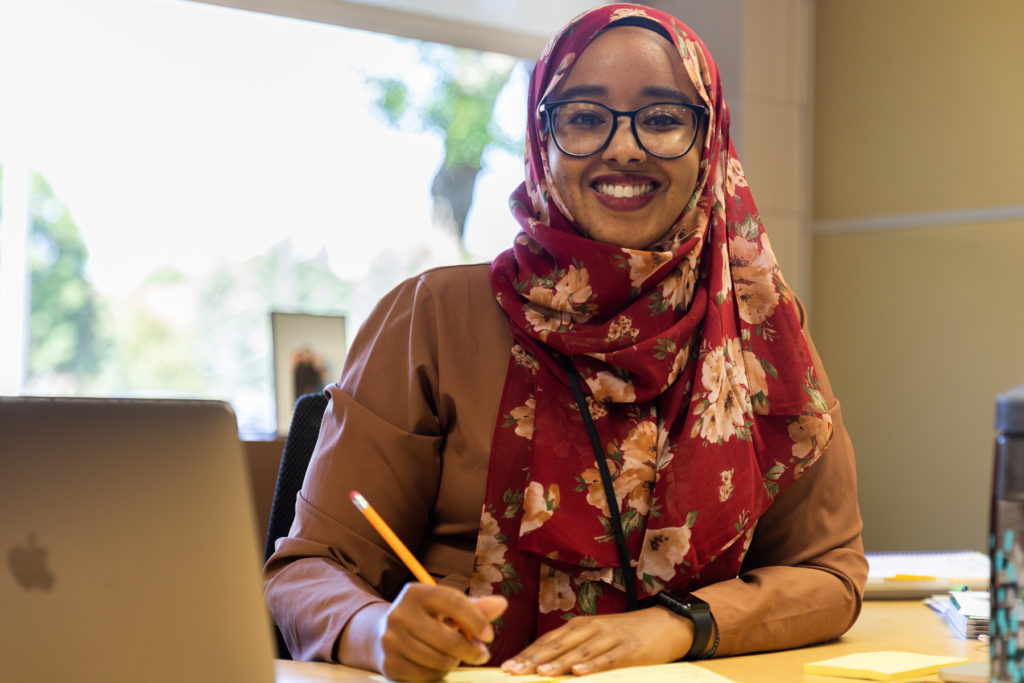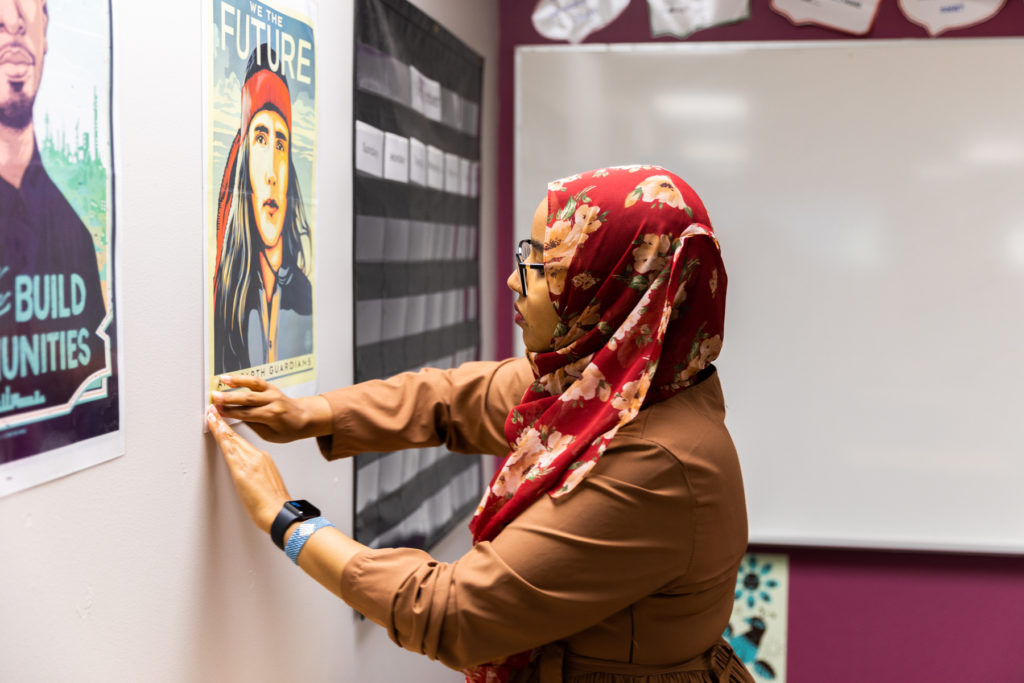This story is part of a special On the Ground series examining the impact of the summer’s nationwide protests – from the police killing of George Floyd to Election Day. Explore the series here.
BURNSVILLE, Minn. — After six months out of school, and an agonizing summer of unrest and reckoning, the students at Echo Park Elementary were eager to return. Fifteen miles south of the Twin Cities, masked and spaced apart, they are finally back in school, penciling their personal attributes onto balloon-shaped construction paper.
Qorsho Hassan, their teacher, models the exercise for them by identifying her own unique characteristics. “I’m silly,” she said, “I speak three languages, and I can write with both hands.”
“You can?” a female student asked, awestruck. Like Qorsho, she wears a hijab.
“I can,” Qorsho affirmed with a nod, her eyes glittering. A smile seemed to hide behind her mask.
Ambidexterity and multilingualism aren’t all that make Qorsho unique. This summer, the 30-year-old became the first Somali American educator to win Minnesota’s prestigious Teacher of the Year award for her uncanny ability to connect with students, letting their questions guide their lessons, and her attention to racial equity in education. She’s taught in Ohio, Malaysia and Minnesota. For many students, she’s the only Somali teacher they’ve yet had, making her an important role model.
“For me as a Black educator, being a window to my students who don’t look like me provides them with different perspectives,” Qorsho said. “For my students who look like me, I see myself as a mirror that represents them and provides them a way to see themselves and their learning in the classroom.”

But it’s a challenging time to be a teacher, even for the most gifted educator. The hybrid model Echo Park Elementary and its district are using means the class is split in half, with each cohort of nine to ten students in the classroom two days a week. For Qorsho, that means daily teaching in person, and creating assignments online for the kids at home.
And the combined traumas of the pandemic, the police killing of George Floyd in Minneapolis and the economic hardship of the recession means students have even more social and emotional needs for teachers to attend to.
On top of all of that, the abrupt transition to distance learning in March meant many educational needs went unmet in the spring–so students are now months behind. “I teach fourth grade, but I have third graders in my classroom,” Qorsho tells me. It’s frustrating for the students: when they struggle, they shut down.
So she’s starting the year helping students focus on their own identities. Nurturing a growth mindset, by lifting up their strengths and identifying areas where they can grow, will help them recognize they can overcome challenges, she explained.
A blond girl raises her hand to share her unique attributes. “I’m small, I can eat mashed potatoes with chopsticks and I speak two languages: English and gibberish,” she announced.
It’s Qorsho’s 9th year as a teacher, but her first year at Echo Park. She lost her job at her previous school in budget cuts, even as she advanced as a Minnesota Teacher of the Year finalist, with her principal and colleagues heaping praise on her.
Sign Up for GroundTruth Weekly
The latest reporting from GroundTruth every Friday, and for free
Though the superintendent, the school board and the teachers’ union all said they wanted to keep teachers like her, her job was cut in a layoff process that disproportionately displaces teachers of color. Only 5% of Minnesota’s public school teachers are people of color, though over a third of students are. Closing that gap is among Qorsho’s priorities as Teacher of the Year, a role that gives her a platform and training to push education policy changes.
Over the summer she worried that as a new teacher at Echo Park, she’d be assigned to the school’s online academy. Having her own classroom has always been a priority for Qorsho, the reason she turned down offers at her previous school to stay in a dean or behavioral specialist position. Working closely with kids, she said, is “my why.”
She was able to keep her teaching position in a classroom, where she nurtures relationships with students and creates an environment where they feel safe to ask questions about difficult topics, like the pandemic and what happened to George Floyd.
In some ways, that’s easier with smaller class sizes. And although it’s only their fourth day together, it’s clear they are already starting to feel comfortable sharing with each other. They didn’t start talking about racism right away, Qorsho says, but the students were bringing it up by Day 3.
“When one student is brave enough to speak up, they all start speaking up,” Qorsho said.
But the logistics of managing a classroom are also much more difficult in a pandemic. Qorsho has to spend more time policing students’ behavior with masks and coronavirus safety protocols. Every day, she uses up and refills hand sanitizer, and when she gets home after work, she changes out of her clothes and hijab to throw them in the washing machine before hugging her mother, who has Type 2 diabetes and is at higher risk for the coronavirus.
She’s working long hours to prepare dual lesson plans, often staying at school till late in the evening. And as Teacher of the Year, she has additional responsibilities managing speaking engagements with the governor and classroom visits with local elected officials.

Her teacher friends feel overextended, too. “I keep a close circle of educators who are positive, passionate, and equity-minded,” she said. “I’ve never had so many teacher friends, including myself, think about quitting.”
Then a recent trip to Duluth, where Qorsho was hoping to enjoy a relaxing weekend, didn’t go as planned. Days before President Donald Trump held a rally there, a group of white men in a pickup truck circled Qorsho, chanting “white power” and “four more years.”
So the next week she spoke out against efforts to discourage Muslim voters in an afternoon news conference–before heading back to class.
She hasn’t brought the incident up with her students yet. She prefers to let them bring up difficult topics, instead of introducing them herself.
“I am very mindful about not retraumatizing, especially my students of color, and really prioritizing Black joy,” she said. “It’ll come up, and when it does I will process with them.”
As Qorsho’s star rises, it’s easy to imagine her running for office or becoming an education commissioner. But it’s hard for her to think about the future with so much to manage in the present.
Sometimes she daydreams about opening a bakery, she said. She doesn’t bake, but she can learn. The world needs more cinnamon rolls, she said. For now, she just wants to get through her ninth year of teaching–through the pandemic.
Back in her classroom, Qorsho gathered the students on the carpet, one at a time, to read a book called I’m Gonna Push Through! It’s an interactive book, she told them, which means she’ll need their help with the call-and-response. As they say the words, they’ll push forward with their hands, she instructed them. “Pretend you’re pushing something really heavy, like an elephant,” she said.
Page spreads show portraits of a diverse group of successful people who “pushed through” difficult circumstances. Students identified Serena Williams, Stevie Wonder, Anne Frank.
“What if it’s too hard?” she asked.
“I’m gonna push through,” the kids chorused.
“What if it’s too tough?” she challenged.
“I’m gonna push through!”
Becky Dernbach covers education in Minnesota’s immigrant and refugee communities for Sahan Journal. This dispatch is part of a series called “On the Ground” with Report for America, an initiative of The GroundTruth Project. Follow her on Twitter: @bzosiad.


































